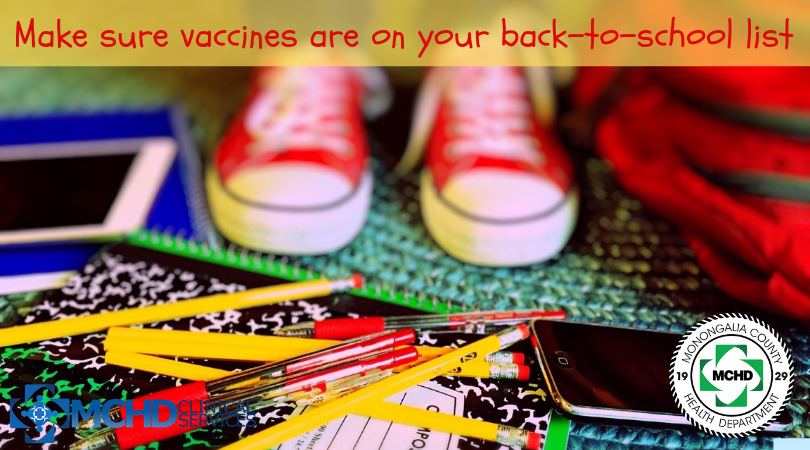Back-to-school means it's also time for vaccines

Aug. 7, 2019
By Mary Wade Burnside
Backpack? Check! Books? Covered! Vaccines? It’s that time again.
It’s Aug. 7 and that means parents and their kids are focused on back-to-school.
While the implements of learning are a big part of that, so are the tools that will help keep students safe from illness while they are learning and interacting with hundreds of their peers.
August is National Immunization Awareness Month, and in the next few weeks, we will be taking a look at how people need vaccines during all stages of their lives, from infanthood to old age.
Because school will be back in session soon, though, we’re going to start with kids who are around ages 5 through early adulthood.
But first, let’s talk about the importance of vaccines. Just think, thanks to a vaccine, most Americans today do not worry about getting polio and having to live their lives in a wheelchair—or an iron lung—because of it.
Smallpox, a disease that could scar and blind its victims—if it didn’t kill them—was declared eradicated by the World Health Organization in 1980.
And illnesses such as chickenpox and measles are no longer considered rites of passage for kids but are still around and pop up in outbreaks among those who remain unvaccinated.
That’s why vaccinations are so important. Flu season two years ago was especially bad; according to the Centers for Disease Control and Protection, 178 children died during the 2017-18 flu season from the illness.
Hepatitis A and Hepatitis B are on the rise, especially in West Virginia. Vaccines provide protection against both of those diseases. Human papillomavirus is usually harmless, but it can lead to several different types of cancer in both women and men. Meningitis, a potentially deadly disease, can often attack those in group settings, such as college dorms or sports teams. There are vaccines that can prevent certain types of both bacterial and viral meningitis.
Plus, tetanus, diphtheria and pertussis, also known as whooping cough, are still real threats that can lead to a variety of dangerous symptoms.
And then there’s the measles. Previously considered eliminated in the United States since 2000, a new outbreak has brought a total of 1,172 cases in 2019 so far. Look at a measles outbreak map, however, and you will see that while West Virginia is surrounded by states with reported cases, thanks to our strict vaccination laws, we officially remain measles-free for now.
The CDC offers an easy-to-read guide on vaccinations that babies should receive from infanthood to the age of 6. These are the mandated vaccines that the state of West Virginia requires students to get in order to attend public school.
For children who have been vaccinated according to the current schedule, here is a list provided by the CDC of recommended vaccines for students between the ages of 7 and 18:
• All preteens and teens need a flu vaccine every year. Some children 6 months through 8 years of age require two doses of flu vaccine. Children 6 months through 8 years getting vaccinated for the first time, and those who have only previously gotten one dose of vaccine, should get two doses of vaccine this season. The first dose should be taken as soon as the flu vaccine is available, and the second dose should be received at least 28 days after the first dose. In following years, only one dose is needed.
In addition to an annual flu vaccine, three vaccines are recommended specifically for preteens:
• HPV vaccine protects against HPV infections that can cause cancer later in life, including that of the cervix, for which women can be routinely screened, as well as mouth/throat, anus/rectum, penis, vagina, or vulva, for which people are not routinely screened.
• Tdap is a booster shot to help protect preteens from whooping cough, tetanus, and diphtheria. Tdap not only protects the child from these diseases, but also keeps them from giving whooping cough to a young baby who does not have immunity yet.
• Meningococcal conjugate vaccine protects against meningitis, and bloodstream infections (bacteremia or septicemia). These illnesses can be very serious, even fatal.
If you haven’t gotten your child vaccinated yet, there is still time. Call your health care provider. Or make an appointment at Monongalia County Health Department’s Clinical Services at 304-598-5119. We are currently holding back-to-school vaccine clinics on Tuesdays, Thursdays and Fridays through Aug. 23. Call us to find out more!
Mary Wade Burnside is the public information officer for Monongalia County Health Department.